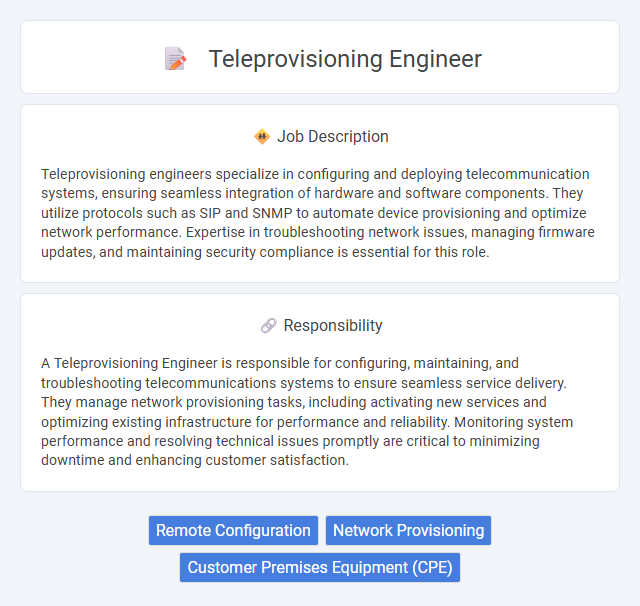
Teleprovisioning engineers specialize in configuring and deploying telecommunication systems, ensuring seamless integration of hardware and software components. They utilize protocols such as SIP and SNMP to automate device provisioning and optimize network performance. Expertise in troubleshooting network issues, managing firmware updates, and maintaining security compliance is essential for this role.
Individuals with strong technical skills and a detail-oriented mindset are likely to thrive as Teleprovisioning engineers, as the role involves configuring and maintaining telecommunication systems. Candidates who enjoy problem-solving and working with network infrastructure may find this job suitable. Those who prefer routine tasks or have limited interest in technology might struggle to adapt to the dynamic demands of this position.
Qualification
Teleprovisioning engineers require a strong foundation in telecommunications protocols, network configuration, and provisioning systems such as DHCP, SIP, and SNMP. Proficiency in scripting languages like Python or Perl enhances automation capabilities and troubleshooting efficiency. Certifications like Cisco CCNA or CompTIA Network+ and experience with OSS/BSS platforms significantly boost job performance and career advancement.
Responsibility
A Teleprovisioning Engineer is responsible for configuring, maintaining, and troubleshooting telecommunications systems to ensure seamless service delivery. They manage network provisioning tasks, including activating new services and optimizing existing infrastructure for performance and reliability. Monitoring system performance and resolving technical issues promptly are critical to minimizing downtime and enhancing customer satisfaction.
Benefit
Teleprovisioning engineers likely experience increased efficiency in managing network configurations remotely, reducing downtime and operational costs for service providers. They probably benefit from the growing demand for automation in telecommunications, enhancing job stability and career growth prospects. Opportunities for developing specialized skills in network protocols and cloud-based provisioning systems are also expected to boost their professional value.
Challenge
Teleprovisioning engineers likely face complex challenges involving the integration and configuration of telecommunications systems across diverse networks. They probably need to troubleshoot intricate provisioning issues while ensuring seamless service activation and minimizing downtime. The role may require adapting to rapidly evolving technologies and protocols, demanding continuous learning and problem-solving skills.
Career Advancement
Teleprovisioning engineers specialize in configuring and managing telecommunication systems, playing a crucial role in network setup and maintenance. Their expertise in automation tools and network protocols creates opportunities for progression into senior technical roles or network architecture positions. Continuous learning in emerging telecom technologies and certifications enhances career growth and leadership prospects within telecom companies.
Key Terms
Remote Configuration
Teleprovisioning engineers specialize in remote configuration of telecommunication devices, enabling seamless deployment and management across networks without physical intervention. They utilize advanced protocols like TR-069 and SNMP to automate firmware updates, parameter settings, and performance monitoring, ensuring device integrity and service quality. Mastery in cloud-based provisioning platforms and scripting languages enhances efficiency in scaling configurations for large subscriber bases.
Network Provisioning
Teleprovisioning engineers specialize in configuring and managing network provisioning systems to ensure seamless service activation and delivery. They utilize automation tools and protocols such as DHCP, SNMP, and NETCONF to optimize network resource allocation and reduce downtime. Expertise in network infrastructure, telecom standards, and real-time troubleshooting is critical to maintaining efficient and scalable communication networks.
Customer Premises Equipment (CPE)
Teleprovisioning engineers specialize in the configuration, deployment, and maintenance of Customer Premises Equipment (CPE) to ensure seamless connectivity and optimal network performance. They handle firmware updates, troubleshoot hardware issues, and optimize device settings to enhance user experience and reduce downtime. Expertise in CPE models, network protocols, and remote provisioning tools is essential for efficient lifecycle management and customer support.
 kuljobs.com
kuljobs.com